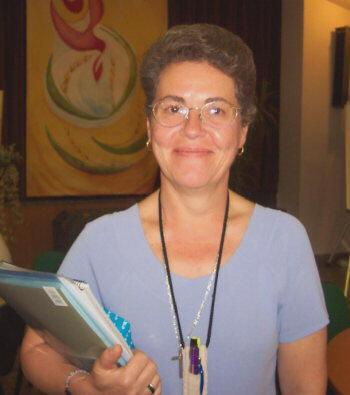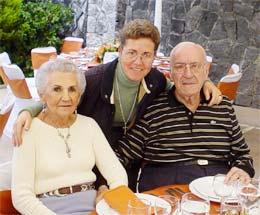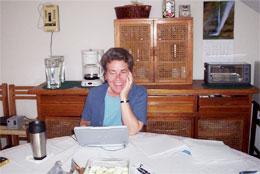Life is a gift and a process, a fascinating opportunity to discover and develop the humanity that dwells within us, alive with the mystery of God, the God who is its source and its horizon, its Alpha and its Omega.
In my natural family there are thirteen of us, five women, six men - one is dead -, and our father and mother, who are still alive - what a blessing! I grew up within that family, and learned to live with personalities very different with regard to age, temperament, history and personal context. We often meet to share food and life. It’s an experience in which I constantly catch sight of God as Communion.
For 33 years I have belonged to the family of the Sacred Heart, which includes the little Society and the big family of those who share our spirituality. There I have learned, and keep on learning, how to make sisterhood a living reality. Having so many sisters is a wonderful gift that entails many challenges, because living as sisters doesn’t come with the wave of a wand. There are certainly deep and spontaneous friendships, and daily relationships are built, rooted in the desire for communion; they sometimes require a little effort, undertaken in faith.
Since I first belonged to this big family, doors have opened onto horizons, experiences and options that it would have been difficult to experience if I had not been here. One decisive and fundamental experience is the affective and effective meeting with the world of the poor at Santa Cecilia, the housing estate on the outskirts of a big city. My current decisions are influenced by the desires of Chita and Francisco, of Luis and Malú, Tere and Memo, Juanita and Javier, and so many other women and men who long for a life of dignity, a world that offers them a chance to work, a land in which God’s merciful justice reigns. I meet people who suffer the consequences of a socio-economic system that is structurally unjust; this has contributed to my discovery and encounter with the Jesus of history and with his plan for God’s reign over humanity.
My two families, natural and religious, have taken me by the hand to lead me into my ecclesial family: our Catholic Church, holy and sinful, full of vitality in the little Christian communities, and also full of contradictions in its structures and organisation, because they exclude women and other minority groups. Its discourses, although full of the gospel, are not always accompanied by actions and attitudes that are really good news for today.
From within my ecclesial family, which I love because my faith has grown up within it, I have become aware of the implications of being a woman. Living and working with women of various ages and lifestyles, of different cultures and beliefs, I have discovered that I am passionate about spending my life seeking equality, sure that this forms part of God’s loving gift. My theological research, the courses I direct and the shared responsability in the Centre for Theological Studies of the Conference of Religious Women and Men of Mexico, are blessed by this conviction.
From my ecclesial family there has also grown my special love for religious life, particularly for feminine religious life. I know the joys and sufferings of so many sisters who have enriched me by what they have shared while I accompanied them in their discernment or in their spiritual exercises. Meeting them has strengthened the certainty that we live in a fascinating time, since we can play an active role in the construction of a new era, in which the gospel and the Spirit are more in evidence.
Finally, as a member of the great human family, I have allowed God to change the images of him that I inherited from my various family settings. In this process, not without its painful silence, Mary of Nazareth has made her presence felt as the close companion of my human faith-journey.
All my families have left their indelible mark on my identity. I am Mexican by birth and heart. I love my country and its people; I give thanks for God’s gift in Our Lady of Guadalupe, and with her I try to find him on the fringes of our systems, exclusive, violent and oppressive as they are.
My belonging to the family of the Sacred Heart has bound me intimately to Jesus, to his heart wounded by violence, and keeps very much alive my conviction that while the world is wounded by injustice, our spirituality has many meaningful ways of answering our peoples’ cries.
Choosing to remain with my big family as it suffers the consequences of structural sin has awakened my senses and moved my energies to seek and work in favour of every life under threat. Latin American theology, which was born among our peoples, has offered supporting arms and nourishment in my search for God, my following of Jesus and my desire to be faithful to the Spirit.
My Christian and ecclesial identity oblige me to be stubbornly insistent in my desire to keep making small gestures that anticipate the fullness of life in reconciliation and communion. This is a gradual process of every day. Feminist theology inspires me and impels me to seek equality.
My love for religious life, for which I have made a free and lucid choice, keeps me in the certainty that this way of life is possible and fulfilling.
Finally, belonging to the great human family increases my thankful awareness that another world is possible if we develop the best of the humanity within us.



